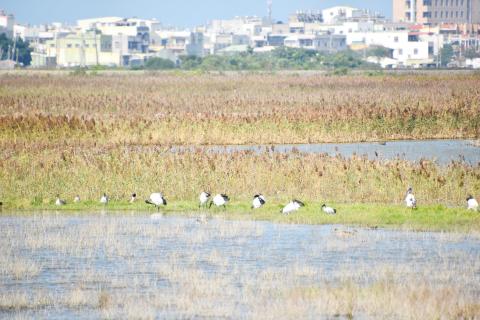Following a court order for the Kaohsiung City Government to withdraw a proposed road construction in a major winter habitat for black-faced spoonbills, bird-lovers yesterday called on the city government to respect the verdict and put conservation above development.
To accommodate increasing traffic demand, the city government proposed building a 900m roadway cutting through the northwestern part of the Cieding Wetlands (茄萣溼地) — the nation’s second-largest habitat for black-faced spoonbills after the Cigu Wetlands (七股溼地) in Tainan.
The proposed project passed an environmental review in 2014, but local residents filed an administrative lawsuit demanding that the city withdraw the project.

Photo: Su Fu-nan, Taipei Times
The Kaohsiung High Administrative Court on Tuesday overruled the environmental review, but has yet to release its written judgement and reasons for the verdict.
In the lawsuit, the plaintiffs stated that the Cieding Wetlands is a nature reserve of national importance inhabited by black-faced spoonbills, peregrine falcons and other protected species, and developments such as the proposed roadway that would have a significant ecological impact should be avoided where possible, but the city government pushed the project despite feasible alternatives to the roadway, which was in violation of the Wetlands Conservation Act (濕地保育法) and the Environmental Impact Assessment Act (環境影響評估法).
Kaohsiung Wild Bird Society general manager Lin Kun-hai (林昆海) said that the environmental review process was hasty and flawed, as the review committee had a predetermined position on the project.
The committee overlooked a more cost-effective and environmentally sustainable option in favor of the roadway, whose advantage has been questioned because a 900m passage would hardly save time for travelers, he said.
Lin added that it was unreasonable for the committee to favor the roadway over an alternative solution that proposes to improve existing roads surrounding the wetlands.
Plans for construction of the roadway showed that it would be closed in winter to avoid disturbing migrating birds, thus making the roadway a dispensable option with a higher environmental cost compared with improving nearby roads, he said.
“The court’s overruling of the case was a clear message to the city government, warning it against having a predetermined mindset and disrespecting the review process. We call on the city government to accept the verdict and not to appeal the case to protect the environment,” Lin said.

Chinese spouse and influencer Guan Guan’s (關關) residency permit has been revoked for repeatedly posting pro-China videos that threaten national security, the National Immigration Agency confirmed today. Guan Guan has said many controversial statements in her videos posted to Douyin (抖音), including “the red flag will soon be painted all over Taiwan” and “Taiwan is an inseparable part of China,” and expressing hope for expedited reunification. The agency last year received multiple reports alleging that Guan Guan had advocated for armed reunification. After verifying the reports, the agency last month issued a notice requiring her to appear and explain her actions. Guan

GIVE AND TAKE: Blood demand continues to rise each year, while fewer young donors are available due to the nation’s falling birthrate, a doctor said Blood donors can redeem points earned from donations to obtain limited edition Formosan black bear travel mugs, the Kaohsiung Blood Center said yesterday, as it announced a goal of stocking 20,000 units of blood prior to the Lunar New Year. The last month of the lunar year is National Blood Donation Month, when local centers seek to stockpile blood for use during the Lunar New Year holiday. The blood demand in southern Taiwan — including Tainan and Kaohsiung, as well as Chiayi, Pingtung, Penghu and Taitung counties — is about 2,000 units per day, the center said. The donation campaign aims to boost

The Kaohsiung Tourism Bureau audited six hotels in an effort to prevent price gouging ahead of Korean band BTS’ concert tour in the city scheduled for Nov. 19, 21 and 22 this year. The bureau on Friday said that the audits — conducted in response to allegations of unfair pricing posted on social media — found no wrongdoing. These establishments included the local branches of Chateau de Chine, Hotel Nikko, My Humble House, and Grand Hai Lai, it said, adding that the Consumer Protection Commission would have penalized price gougers had the accusations been substantiated. The bureau said the Tourism Development Act

The military yesterday said it has located the flight data recorder, or black box, of an F-16V jet that disappeared off eastern Taiwan earlier this month, and it would soon deploy a salvage team to try to retrieve it. Air Force Command Headquarters said that while it had pinned down the location of the black box, it was still searching for the aircraft’s sole pilot, air force Captain Hsin Po-yi (辛柏毅). Without providing details, the air force said it had located the black box days after detecting some intermittent signals and would now engage a team of professionals to retrieve it. The air